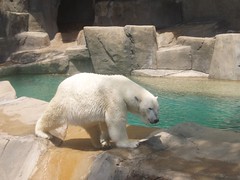Russian researchers have spotted an extremely rare white albino orca off the coast of Kamchatka for the first time in history...
Iceberg the white Orca...
A Russian research ship has spotted an extremely rare white adult orca, or killer whale, off the coast of Kamchatka for the first time in history. The reason for the whale's unusual pigmentation is as yet unexplained.
The scientists identified the whale by his pure white fin, swimming together with his pod, or family, all of which have the standard black and white coloration.
He has been given the nickname Iceberg, and appears to be behaving normally.
"Iceberg seems to be fully socialized; we know that these fish-eating orcas stay with their mothers for life, and as far as we can see he's right behind his mother with presumably his brothers next to him," said Dr. Erich Hoyt, who co-leads the scientific group that spotted the mammal.
Read more:
The scientists identified the whale by his pure white fin, swimming together with his pod, or family, all of which have the standard black and white coloration.
He has been given the nickname Iceberg, and appears to be behaving normally.
"Iceberg seems to be fully socialized; we know that these fish-eating orcas stay with their mothers for life, and as far as we can see he's right behind his mother with presumably his brothers next to him," said Dr. Erich Hoyt, who co-leads the scientific group that spotted the mammal.
Read more:
http://rt.com/news/white-killer-whale-russia-islands-751/
Ecospree















